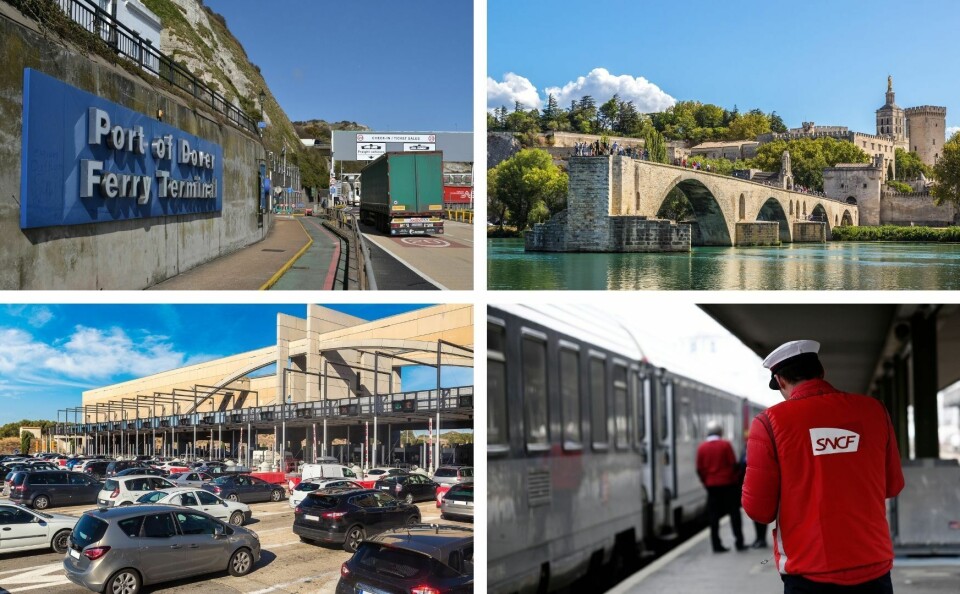-
France’s €3 book delivery fee challenged in EU court by Amazon
Online retailer said measure is protectionist and ‘in breach of EU laws’
-
Allergies: How to know pollen levels in your commune of France
Interactive online maps can track and predict how pollen is changing in the air
-
Law to revamp public transport behaviour and penalties adopted in France
The bill is controversial for some, with critics saying it will invade people’s privacy and liberty
New train line, Dover ferries, busy roads: Nine France travel updates
We also look at how a couple found themselves the only passengers on a flight

We look at the stories affecting travel to, from and around France this week.
Fête nationale holiday causes congestion across France
Yesterday’s Fête nationale public holiday (July 14) has given many people in France the opportunity to faire le pont to the weekend and take today (July 15) off and enjoy long weekend breaks away.
As a result, traffic forecasting service Bison Futé has warned of heavy traffic lasting until Sunday.
Today, traffic conditions will be “difficult” across the whole country in terms of departures from urban centres, and “very difficult” in the south east.
Saturday is expected to be “very difficult” in terms of departures and “difficult” in terms of return journeys.
On Sunday, the traffic will shift towards those coming back from weekend breaks, becoming “very difficult” in terms of return journeys. It will still, however, be “difficult” for people departing from urban centres.
Traffic conditions should return to normal on Monday (July 18).
To see which roads are expected to see particularly heavy traffic and when see: Fête nationale holiday: where to expect heavy traffic in France
Port of Dover implements new measures to reduce summer delays
The Port of Dover has said that it is working to expand its border controls and streamline traffic systems ahead of the start of the UK summer holidays.
For example, the Port is increasing its French border control booths by 50% to keep passengers flowing through. The new booths are expected to be in operation by next weekend (July 22-24).
In addition, toilet facilities and a new refreshment stall will be positioned before border control.
Passenger numbers are expected to reach pre-pandemic levels this summer, and customers are advised to leave 60-90 minutes to get through passport checks at peak times.
No more SNCF strikes this summer
Unions representing SNCF workers announced this week that they had no further strike action planned for the rest of the summer.
Instead, negotiations with operator bosses will resume on September 1.
SNCF unions last led strike action on July 6, which resulted in SNCF bosses offering pay rises averaging approximately 3%.
The Unsa union welcomed these “encouraging measures”, but SUD-Rail said that the “matter is not settled” and the CGT said that “employees are currently asking for 7%”.
Transavia strike: 30% of flights cancelled today and Saturday
Cabin crew at Air France-KLM’s low-cost subsidiary Transavia are striking this week, and 30% of flights will be cancelled today (July 15) and tomorrow.
Cancellations will affect flights to and from Nantes-Atlantique, Paris-Orly, Lyon-Saint Exupéry and Montpellier-Méditerranée, among others.
On Sunday, the airline’s operations will slowly begin to return to normal with 25% of flights cancelled.
The strike began on Wednesday (June 13), with the SNPNC-FO national flight attendant union calling for pay rises and better working conditions for air stewards and stewardesses.
“Transavia France teams are doing everything they can to limit the consequences of this action on flight schedules,” the airline has said.
Read more: Summer strikes and cancellations: what to expect at French airports
Read more: Post Brexit can I get EU compensation if UK-France flight cancelled?
Historic Pont-Saint-Esprit, Avignon, Nîmes train line to reopen
A train line running along the river Rhône from Pont-Saint-Esprit (Gard) to Avignon (Vaucluse) to Nîmes (Gard), which has been closed since 1973, is set to reopen on August 29.
There will also be a stop at Bagnols-sur-Cèze, which is the third most populous commune in the Gard department.
Overall, the journey between Pont-Saint-Esprit and Avignon should take around 25 minutes, compared to 50 minutes in a car.
The reopening of the line aims to better cater for the area’s growing population; in 1975 Gard had 495,000 inhabitants in 1975, but this number has since grown to nearly 755,000 in 2022.
The Occitanie region hopes that the service will eventually carry 200,000 passengers per year, with five return trains running each day between Pont-Saint-Esprit and Avignon, and one continuing on to Nîmes. This will add a further 40 minutes to the journey.
By 2026, it is hoped that the train will also stop at Laudun-l’Ardoise, Roquemaure/Tavel and Villeneuve-lès-Avignon on the Pont-Saint-Esprit-Avignon stretch, and Aramon, Remoulins/Pont du Gard and Marguerittes on the Nîmes section.
Reopening the line is expected to cost SNCF Réseau and the Occitanie region €100million between now and 2026.
Ticket prices will start at €3 – or €1 for 18 to 26-year-olds – with monthly season tickets also available.
Air France adds ‘fuel surcharge’ of up to €300 to ticket prices
Air France has added a ‘fuel surcharge’ to some short and medium-haul tickets to compensate for the rise in the price of kerosene.
On short-haul flights, the additional cost ranges between €50 and €150 for a return ticket. For medium-haul flights, the surcharge is €100-€300 for a return fare.
The routes affected by the revised prices include Paris-Malaga, Dublin, Lisbon, Madrid, London, Milan, Rabat, Rome, Venice and Vienna.
However, the surcharges will only apply to the most expensive tickets, such as those for Business Class.
In general, flights leaving metropolitan France became 16-19% more expensive over the 12 months to May according to figures from aviation authority the Direction générale de l’aviation civile.
This is not only due to the rise in kerosene prices, but also to increased maintenance costs and salaries.
Cars limited to 70km/h on Toulouse ring road due to pollution
The city of Toulouse has temporarily reduced the speed limit from 90km/h to 70km/h on the ring road because of a spike in air pollution.
Read more: Speed cameras, tunnel signs: Five updates for drivers in France
For several days, the air quality has been poor in Haute-Garonne because of the current high temperatures and lack of wind.
Aujourd'hui 14/07/2022 et demain 15/07/2022 épisode de #pollution en #Occitanie Dpnt 31 et Dpnt 65 https://t.co/liBGyrbGc9 pic.twitter.com/hIKaBUUJJJ
— Atmo OCCITANIE (@Atmo_oc) July 14, 2022
On all other portions of road where the speed limit is normally 90km/h, drivers will also be obliged to travel at 70km/h, and on roads with a 110km/h limit, at 90km/h.
Finally, stretches which usually have a 130km/h speed limit will have a temporary 110km/h limit imposed.
🛣️Abaissement des vitesses autorisées :
— Préfet d'Occitanie et de la Haute-Garonne (@PrefetOccitanie) July 14, 2022
• à 110 km/h sur les portions à 130 km/h
• à 90 km/h sur les portions à 110 km/h
• à 70 km/h sur les portions à 90 km/h
🔥🌲 Interdiction de l’incinération des végétaux
🏭Report d’opérations polluantes industrielles
Local residents are also encouraged to use public transport where possible, and to delay household tasks such as lawn mowing or painting.
If you are experiencing breathing difficulties, you should call your doctor or the Air Santé helpline on 05 61 77 94 44.
Agadir-Paris flight takes off with two passengers on board
A French couple were surprised to find themselves alone on an Air France flight travelling from Agadir (Morocco) to Paris-Charles de Gaulle after their original Transavia flight was cancelled.
Thomas and Julie, who were transported on an Airbus A319 capable of accommodating 140 people, told Le Progrès: “We couldn’t believe it”.
With no other passengers to serve, the cabin crew offered the couple a meal with champagne, and the pilot gave them a detailed flight itinerary.
Air France has said that the lack of passengers was an “exceptional event” relating to the Transavia cancellation, but accepted that the situation was “problematic”.
Paris-Limoges trains could be 35 minutes quicker, new study suggests
Train journeys between Paris and Limoges could be cut down to two hours 40 minutes, according to a new study published by Urgence Ligne Paris-Orléans-Limoges-Toulouse, which promotes the development of rail links between the cities.
The journey currently takes three hours and 15 minutes, and rail authorities had predicted that this could be reduced to two hours 49 minutes by 2025.
However, the study suggested that this could drop even further by 2027 with a modernisation of the line.
This project would require significant funding; the government has already promised a total of €1.9billion for modernisation works, and local authorities should provide a further €128million.
However, the region of Nouvelle-Aquitaine is currently refusing to supply funding.
Related articles
French MPs block maintaining Covid pass for international travellers
France travel: what are the rules for flying with a pet?
French holiday costs: How have they been affected by inflation?
























